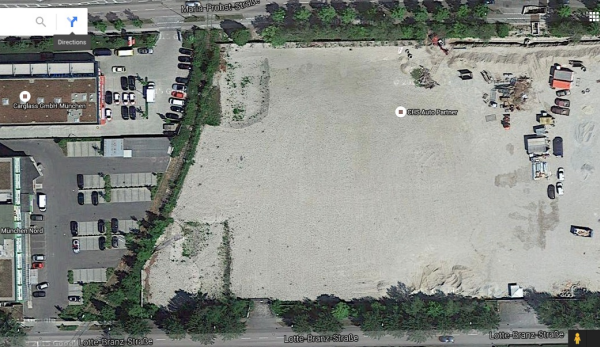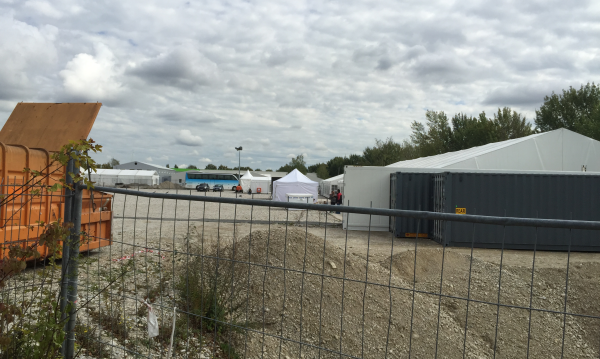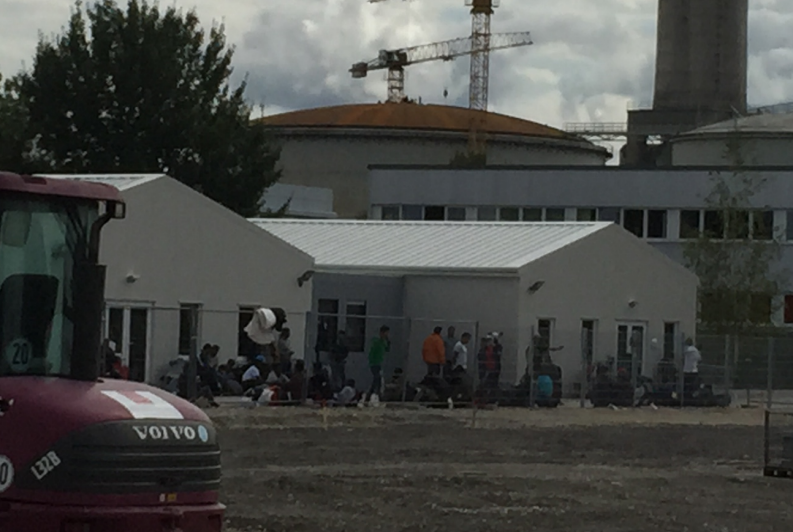The Migration Crisis, a Firsthand Report from Munich
Helping a wayfarer make it to Stockholm Sep 24 2015
By our correspondents in Germany, Kenneth and Natalya MacWilliams
Europe is being engulfed. Within Europe, Germany is experiencing the brunt of it. Within Germany, Munich is by far experiencing the brunt of it. Munich can for the moment be called ground zero.
There are many migrant and refugee centers in the greater Munich area. Migrants are first received at a central registration point where they remain for only one or two days while information about them is recorded, and then they are sent to various camps on some basis, where they remain until whatever will happen.
It was on Saturday that Natalya and I decided we wanted to find this initial screening center, thinking that there we would get the best handle on the nature and composition of the first migrant wave that has been crashing on Munich.
Finding it was easier said than done. From many inquiries within central Munich we eventually got a lead that it was in a certain general area on the outskirts of the center. So we took the U-bahn (subway) out to that general area and began walking the streets (kind of a deserted area) and asking questions. After walking in various different directions for about an hour (fortunate that it was a gorgeous day) and asking about a dozen people (none of whom knew anything) we finally hit upon three old men drinking beer (at 9:30 AM ) in the back of an outside, dilapidated tavern. They were semi-smashed (nothing to do with Oktoberfest; this was their normal routine) but one of them spoke a few words of English (he understood “refugee” and “where?”). In spite of the language barrier and the alcohol he seemed to know what he was talking about. He pointed us in the right direction and indicated that it would be a very long walk. Off we went (again thankful for the beautiful, cool day) until we came across a parked bus and asked the driver for more precise directions. He was north African and knew immediately where the migrants were. He motioned us aboard and in ten minutes he let us off directly across from the non-marked, barely visible refugee center, seemingly out in the middle of nowhere with industrial buildings all around.
This is a satellite photograph of the area which was taken prior to all of the temporary buildings and shelters just being hastily erected to process and hold these daily arriving groups of migrants.

We stood around curbside for a little while, getting our bearings. No one was walking by or along the street, and the only activity we saw were occasional buses going in and out. We quickly realized that the entire area appeared to be fenced or walled off and that there was only one entrance, which you can see in the bottom right hand corner of the photograph, just inside the fence, just above the words “Lotte-Branz”. So it was through this entrance that we boldly marched, straight into the arms of the federal German security.
They were polite but extremely firm that there was no way we were going to get inside, and I tried everything. And they absolutely forbid photographs. So eventually we were turned around and marched back out.
At that point we walked around the whole perimeter and eventually I wandered up some old abandoned railroad tracks (on the left margin of the property in the satellite photo above) and found a spot where I could climb up on something and get some photos over the fence without being noticed. From there I was able to take this:

Here are some of the migrants, sitting outside (I’m apparently really asking for trouble here because I was explicitly warned away in no uncertain terms):

During this process we noticed that some of the migrants from inside the area walked out of the area without any problem. We spoke to those of them who could speak a little English (most could not) and learned that the migrants within the camp were being registered and would be moved elsewhere within a day or two maximum, to make room for new arrivals. We also learned that while they were in this camp they were free to leave the camp and walk outside of it if they wished (they were not being confined) but that from a practical standpoint there was nowhere to go because (a) so few of them spoke any English, (b) they had little money in their pockets, (c) the area in which this camp was located was apparently out in the middle of nowhere in a light industrial area, and (d) none of them had any idea where they were in the greater Munich area or any idea how to move around within it.
It was at this point that Natalya and I settled down, out of view of the security police, and began approaching every wandering migrant we could see to determine if they spoke any English and to ask if they would talk with us about why they had made the overall effort from day # 1 in their long journey, and about what they had been through and experienced thus far. What can be said here is that every one of them who admitted to speaking English was willing to talk with us, more or less openly to one extent or another. And all of them said they were being treated well by Germany, that the accommodations were OK and that the food was OK and that most importantly they felt safe. In our opinion Germany truly is to be complimented. Everything the country has done is exemplary. Germans are entitled to and should stand tall.
We ourselves had no lunch because we had never imagined it would take us so long to find the place and we had expected to be back in Munich for a late lunch. That was not to be, but eventually lack of food and water got the better of us in the afternoon and that is when we decided to call it quits and to try to find our way back into central Munich. We could not find any bus stop (the bus that brought us there initially appeared to go out of his way to do so and dropped us off at a non-bus stop). But after finally finding some Germans we got directions to a bus stop and eventually got there, which is when chapter two of this most interesting day began.
As we were sitting on a bench beside the road waiting for what seemed forever for a local bus to take us to the nearest U-Bahn station, a young teenage black boy with the eyes of a deer fearfully caught in the headlights very cautiously approached us and asked us in barely understandable and halting English (it took several tries for us to get it) if we could tell him where there was a toilet. Slowly, over time, as he sat on the bench, we learned that we was a migrant or refugee, that he had been taken to the camp that morning, that he would be moved to a permanent camp later today or the next day, and so — with 100 Euros in his pocket (his copy of his migrant registration paper which I asked to see indicated that) and with a plastic grocery bag stuffed with a parka -- he had decided to continue on his journey to his final destination of Stockholm and had simply walked walked out of the registration center and was heading on his way. We asked him what his plan was, how he intended to get to Stockholm. Eventually he was able to communicate that he was going to first try to find the railroad station in Munich (he had no idea where it was or how to get there) and that he would go first by train to Hamburg and then to Copenhagen and then to Stockholm. By the time we were learning all of this — and it took a lot of time because his English was almost non-existent and frequently I took to drawing pictures to explain things — we were all on a bus that was thankfully heading toward an outer U-Bahn stop.
So over the next hour or so with him on the bus, in the subway, and in the Munich central train station we eventually learned — it came out slowly, as I said, in broken bits and pieces — the following. He was from Eritrea and had reached Munich by way of Italy. He arrived in Munich early that morning on a train from Italy, where he was picked up in the train station by the police and taken to the registration camp Natalya and I had just found. We tried to convince him to stay in Germany and to return to the Munich initial registration camp where we assured him he would be very well cared for but he was adamant against it. Our continual insistence eventually surfaced the fact that his brother was in Stockholm and he was trying desperately to get to his brother. His mother and his four year old sister were still in Italy, where they had all somehow arrived safely from Eritrea. None of them spoke any better English than he did.
He believed that if he remained in the Munich camp that it would be weeks and months before he would be allowed to proceed, and at that time he feared the borders with Denmark and Sweden might be closed. And that delay would also stop him and his brother from helping his stranded mother and four year old sister. He had no idea about train fares and his 100 Euros were immensely less than what he would need to buy train tickets for same day travel from Munich to Hamburg, then change trains for Copenhagen, then change trains to get to Stockholm. Buying tickets a day in advance would have reduced the fare somewhat but would have required him to sleep in the open because of no money, and that would have significantly increased the likelihood that he would be picked up by the police and taken to a refugee camp further on.
So he was bound and determined to move on northwards right then and there, against all odds. And he was asking no one for any help.
We were by now in the train station and it was at this point that I asked him to sit still and stay with Natalya until I came back. From my time here last winter I had a very good and reliable contact near the station who was an expert in travel documents and on travel laws and on railroad passage, so I went to talk to him and fortunately found him. He assured me that if the police picked him up again that he would find himself right back in the registration camp. He also said that his only chance of making it to Stockholm would be to buy right now a ticket to Hamburg — the train was leaving in 30 minutes — and that ticket would leave him with a balance of 4 Euros in his pocket — and the minute he got off the train in Hamburg to buy his next ticket on to Copenhagen, and the same in Copenhagen … so that if the police questioned him anywhere along the way he could show them the ticket plus cash in hand as proof that he was not a vagrant.
So I went back to Natalya and spoke with her privately. We both agreed on the crazy thing we did next. We explained to him the concept of a loan. That he understood once we got over the language barrier on that concept. Then we told him we were going to make him a loan of all the money he needed to buy all the train tickets he needed to get to Hamburg and then to Copenhagen and then to Stockholm (Natalya had checked the exact amounts) and told him that he should hold onto his 100 Euros for food and buses etc. And we asked for his promise that once he reached his brother and once they got their mother and sister to Stockholm with them, and once they were earning any money and could afford to do so, that he should contact us and repay us.
He agreed most emphatically, but who knows. What struck both Natalya and me about him was that throughout all of this he had, as I said, the look of a deer caught in the headlights and seemed quietly terrified. In any case it was our instinct that he was honest and we trusted what he said, and we went with that.
He has our names and addresses and we have his name and the information from his Munich registration papers. We have no idea whether we will ever hear from him again, but I’m betting that at some future date we will, especially since he promised to let us know if he reaches his brother. And if he ever earns enough money to pay us back, and tells us he is ready to do so, what we plan to tell him is to consider his debt paid providing he takes the money he was going to send to us and turns around and finds someone else who is in the position he is in today and helps that person himself just as we helped him today.
So at that point, with just minutes to spare before the train for Hamburg left Munich station, we walked him to a 2nd class car, got him seated, and told the German car attendant to take good care of him. And before I left I asked him if he knew what a lion was. Finally he understood and said yes. Then I asked him if he knew what a heart was. He got that more quickly. Then I told him that even though he was very young that he had the heart of a lion. At that, for the first time, some fear left his eyes and he smiled. That smile made it all worthwhile for Natalya and me even if nothing more ever comes of any of this.
Please subscribe if you haven't, or post a comment below about this article, or
click here to go to our front page.


This is an inspirational story, just what I would expect from our two intrepids!
But it is now February 29 and I wonder if there is a sequel yet from our lion-hearted investigators?
Our correspondents live in the U.S., were in Germany for a year, but have since returned. Thanks for commenting,
Stephen Wilson
Principal Editor
Kenneth: What an incredible story, it will have a profound ending.
Somebody’s prayers connected you and the Eritrean youth together in what will surely become a chapter (Escape from Eritrea) in a book about the Migration Crisis.
You might even write the book. 15 more escapades like this and you will have it.
An excellent example of Investigative Journalism.
Excellent article, well written and very informative. I felt that I was there. I commend your correspondents for their persistence in getting the story.
Their kindness in helping one migrant forward is inspirational.